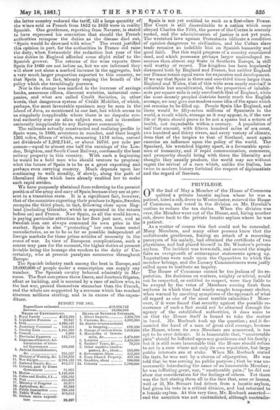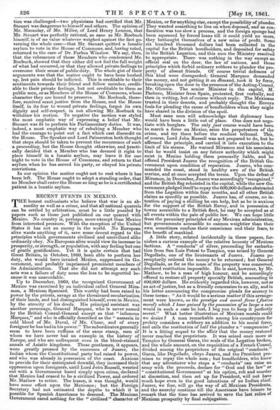PRIVILEGE.
-ON the 2nd of May a Member of the House of Commons quitted a private lunatic asylum where he was a patient, hired a cab, drove to Westminster, entered the Houle of Commons, and voted in the division on Mr. Horsfall's motion to reduce the tea duties. When the division was over, the Member went out of the House, and, hiring another cab, drove back to the private lunatic asylum where he was a patient. As a matter of course this fact could not be Concealed. Many Members, and many other persons knew that the unfortunate gentleman, fearing an attack of a recurring paroxysm of his malady, had obtained the certificate of two physicians, and had placed himself in Dr. Winslow's private asylum. The incident was town-talk, and around the simple facts an overgrowth of extravagant statements sprang up. Imputations were made upon the Opposition to which the member belongs, and the Lunacy Commissioners were justly called upon to-institute an inquiry. The House of Commons cannot be too jealous of its re- putation. Its decisions on matters, weighty or trivial, would not be respected, or entitled to respect, were they liable to be swayed by the votes of Members coming fresh from asylums in which they had wisely sought temporary shelter, when warned by unerring symptoms of the approach of what all regard as one of the most terrible calamities ? More- over, if it were found that security against the possible re- currence of such a fact could not be obtained through the agency of the established authorities, it does seem to us that the House itself is bound to take the matter in hand. Mr. Roebuck took up the question ; and it de- manded the hand of a man of great civil courage, because the House, where its own Members are concerned, is too apt to be over delicate. It is lamentable that, "unutterable pain" should be inflicted upon any gentleman and his family ; but it is still more lamentable that the House should refuse to act in a case where not only its own reputation, but large public interests are at stake. When Mr. Roebuck, stated the facts, he was met by a chorus of objurgation. He was told that he was servina.. no public purpose ; that he was un- necessarily introducing the name of an honourable Member ; he was inflicting great, nay, "unutterable pain ;" he did not show due consideration for the feelings of others. Yet there was the fact staring them all in the face that, sane or insane, well or ill, Mr. Steuart had driven from a lunatic asylum, had given his vote in a critical division, and had returned to a lunatic asylum. At this very time, Mr. Roebuck asserted- and the assertion was not contradicted, although contradic- tion was challenged—two physicians bad certified that Mr. Steuart was dangerous to himself and others. The opinion of Mr. Macaulay, of Mr. Miller, of Lord Henry Lennox, that Mr. Steuart was perfectly rational, as sane as Mr. Roebuck himself, is of no value whatever weighed against the fact go- verning the whole case—that Mr. Steuart quitted a lunatic asylum to vote in the House of Commons, and, having voted, returned to the care of Dr. Forbes Winslow. We say, then, that the vehemence of . those Members who condemned Mr. Roebuck, showed that they either did not feel the full weight of what had occurred, or that they allowed private feelings to overcome their sense of public duty. The whole gist of their arguments was that the matter ought to have been hushed up, lest pain should be inflicted. This is creditable to their sentiments towards their friend and fellow member, credit- able to their private feelings, but not creditable to them as public men, or as Members of the House of Commons, whose character they are bound to preserve. Mr. Roebuck, there- fore, received scant justice from the House, and the House itself, in its fear to wound private feelings, forgot its own dignity and self-respect, in not allowing Mr. Roebuck to withdraw his motion. To negative the motion was styled the most emphatic way of expressing a belief that Mr. Steuart was fit to perform his Parliamentary duties. It was, indeed, a most emphatic way of rebuking a Member who had the courage to point out a fact which cast discredit on the House. The Speaker and Lord Palmerston both thought that steps should be taken to prevent the recurrence of such a proceeding, but the House thought otherwise, and tracti- any decided that a Member who has deemed it right to place himself in a lunatic asylum, may leave it for one night to vote in the House of Commons, and return to that asylum when he has served his party, or obeyed his private convictions.
In our opinion the matter ought not to rest where it has been left. The House ought to adopt a standing order, that no Member shall enter the House so long as he is a certificated patient in a lunatic asylum.































 Previous page
Previous page